Albo’s decades-long push for a treaty revealed: Anthony Albanese signed a letter demanding reparations in 1986 – as calls grow for Linda Burney to resign after refusing to answer questions
- Mr Albanese has supported principles of treaty since 1986
- He has set aside millions in funding to a treaty commission
- Liberals have questioned Linda Burney’s role as Minister
- Do you have a politics tip? Email brittany.chain@mailonline.com
Anthony Albanese has supported a treaty with Aboriginal Australians for nearly four decades, it has been revealed, as an open letter he signed in 1986 which outlined a demand for reparations resurfaces.
The then 23-year-old leftwing activist signed the open letter to The National Times, dated April 18, 1986, with Indigenous leaders Pat Dodson and Marcia Langton.
The letter supported the ‘granting of land rights and appropriate compensation’ for the ‘invasion of Aboriginal land’.
It called for ‘recognition of (Aboriginal) sovereignty, land rights, and compensation for lands lost and for social and cultural disruption’.
Mr Dodson and Ms Langton, who are both heavily involved in the ‘Yes’ campaign ahead of the Indigenous Voice to Parliament referendum, were listed as points of contact for readers seeking more information.
The revelation comes as the Albanese-led Labor government moves to distance the concept of treaty – and any suggestion of compensation for Indigenous Australians – from the Voice referendum, to be held between October and December.
However, the Prime Minister took the concept of treaty to the 2022 election and has already set aside $5.8million to start the process with a Makarrata Commission
He has also repeatedly vowed his full support for the principals outlined in the Uluru Statement from the Heart: ‘Voice, Treaty and Truth’.
A government spokesperson told Daily Mail Australia that ‘consultation on a Makarrata and progress on its design would only take place following the referendum’.
However, with the referendum now just three months away and with polls showing support for the Voice is softening, Mr Albanese and his ministry are hesitant to link treaty-making and truth-telling to the Voice.
He told ABC Radio National on Wednesday morning he will not move to negotiate a treaty or treaties in his first term – contradicting an election campaign vow he made in November 2021 in which he said a Makarrata Commission would be required to report to the Labor government on treaty progress within Mr Albanese’s first term.
The National Indigenous Australians Agency confirmed earlier this year that progress on the Makarrata Commission has been paused until after the referendum.
At the time, Senator Lidia Thorpe said: ‘The government’s handbook on questions related to First Nations issues now is an automatic response saying “we’ll deal with that after the Referendum”.
‘They have spent $900,000 on Truth and Treaty and have nothing to show for it. Less than a year ago Minister Burney was speaking about how the public shouldn’t forget that the Uluru Statement was about Truth and Treaty as well as the Voice.’
Indigenous Affairs Minister Linda Burney is now fighting off questions about her capability as a minister after she refused for two days to answer questions from the Opposition about what happens if the Voice is successful in parliament this week.
Deputy Opposition Leader Sussan Ley told Daily Mail Australia she doubts whether Ms Burney is ‘up for the task of being a Minister’.
‘I know it is not just me who is thinking that,’ Ms Ley said.
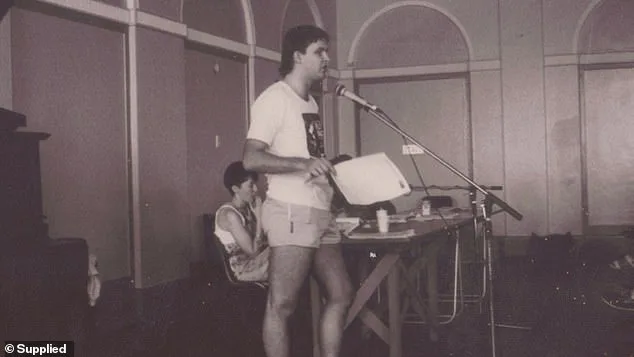
Ms Ley questioned why ‘time and time again, she refused to confirm if she was still committed to Makarrata even as the taxpayer, at her direction, is ploughing millions of dollars into it’.
‘The Albanese Government is being tricky on the Voice, tricky on the Treaty and tricky on Makarrata and given the chance to justify their approach Minister Burney hid from scrutiny,’ she said.
‘What we saw today was not acceptable and not the standard we should accept from a minister of any government.’
Asked several times already this week about the government’s commitment to a Makarrata Commission, Mr Albanese, Ms Burney and Finance Minister Katy Gallagher have tried to draw focus back to the Voice.
‘The referendum question is simple,’ they have each argued.
Australians will not be asked whether or not a treaty – or Makarrata Commission – should be written into the constitution.
The referendum question itself focuses solely on the Voice, just as Mr Albanese and his team have stated.
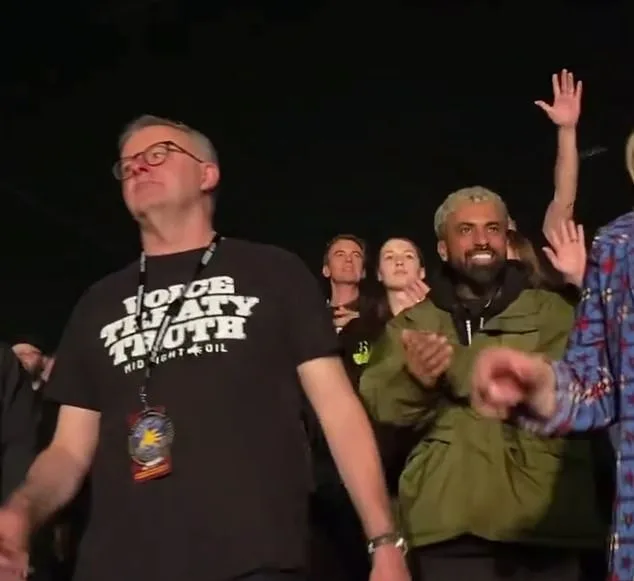
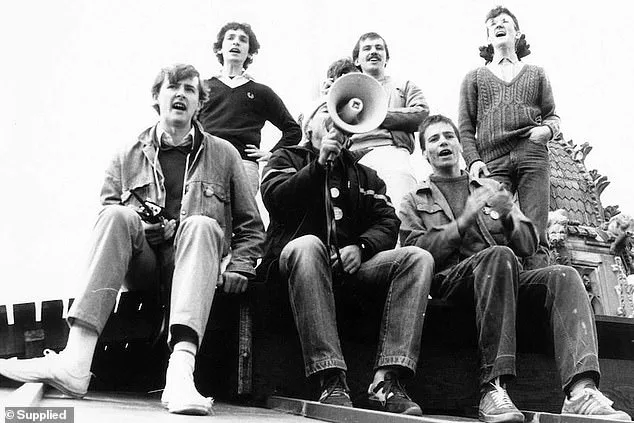
Both Mr Albanese and Ms Burney have repeatedly vowed to support the Uluru Statement in full, which makes abundantly clear that treaty is ‘the culmination of our agenda’.
In his first mini-Budget after the election in October 2022, Mr Albanese set aside $5.8million for the advancement of the Makarrata Commission.
In total, he has pledged a total of $27million to the Commission.
A Makarrata Commission would have the ‘authority to facilitate the process of treaty-making and truth telling’ between the two groups, according to the Uluru Statement from the Heart.
Mr Albanese outlined the responsibilities of such a future commission in a statement on November 15, 2021.
And after winning the May 2022 federal election, he declared the new Labor government would adopt the Uluru Statement of the Heart ‘in full’.
Mr Albanese said at the time: ‘As called for in the Uluru Statement, the Makarrata Commission will have responsibilities for overseeing processes for Treaty-Making and Truth-Telling.
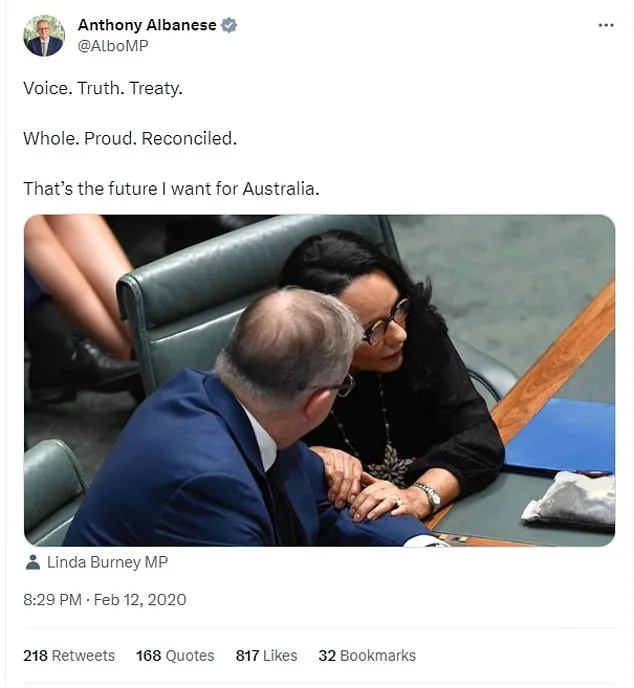
‘The Makarrata Commission will be independent… and will work with a Voice to Parliament when it is established.’
Responsibilities of the commission would ‘initially’ include consulting with First Nations communities, recommending a ‘framework for federal treaty-making’ and, crucially, delivering a report within the first term of a Labor government.
By that schedule, the commission will have had to be established and had enough time to consult the community and deliberate by 2025, when the next election is due.
Speaking to Pat Karvelas on the ABC on Wednesday morning, Mr Albanese argued Makarrata is about ‘reconciliation’.
Makarrata is a Yolngu word which translates to ‘a coming together after conflict, or a struggle’ and is the concept of bringing ‘peace after a dispute’.
‘It is about reconciliation,’ he said. ‘And do I support reconciliation? Yes I do.’
But Reconciliation NSW created a ‘beginners guide to the Uluru Statement‘, which says ‘Makarrata’ has ‘long been proposed as an alternative name for the treaty process in this country’.
‘It is a complex Yolngu word describing a process of conflict resolution, peacemaking and justice,’ Gumatj woman, Merrikiyawuy Ganambarr-Stubbs said in the guide.
‘Makarrata literally means a spear penetrating, usually the thigh, of a person that has done wrong… so that they cannot hunt anymore, that they cannot walk properly, that they cannot run properly; to maim them, to settle them down, to calm them — that’s Makarrata.’
But she said the meaning is ‘more aligned to the spirit of what many hope a treaty process would look like’ is a ‘negotiation of peace… where both parties agree to one thing so that there is… no other bad feeling’.
Treaty-making processes are already underway in several states, Mr Albanese noted.
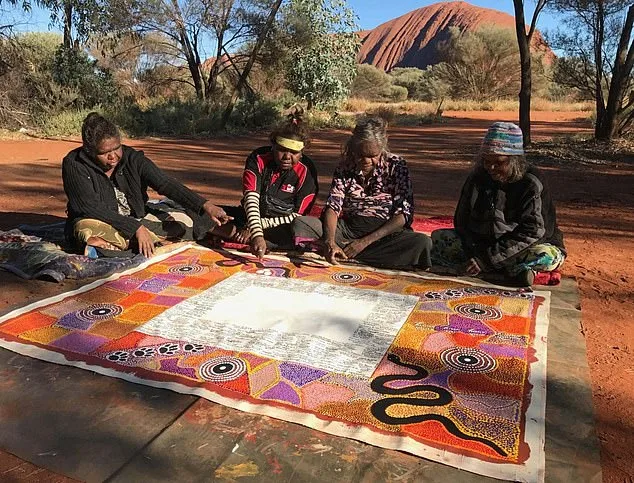
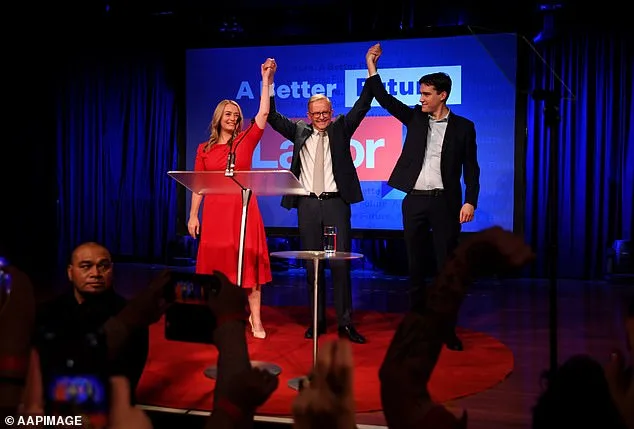
The Opposition in Queensland has agreed to work with the state Labor government to support treaty, Dan Andrews’ Labor government has been negotiating in Victoria and talks are underway in the Northern Territory.
Mr Albanese argued there is no single treaty, prompting Ms Karvelas to note there are ‘potentially many underway’.
‘It’s like saying do you support the sun coming up, it’s occurring.’
‘That’s occurring with the states… what the No campaign want to do is focus on everything that’s not happening and nothing that is.’

